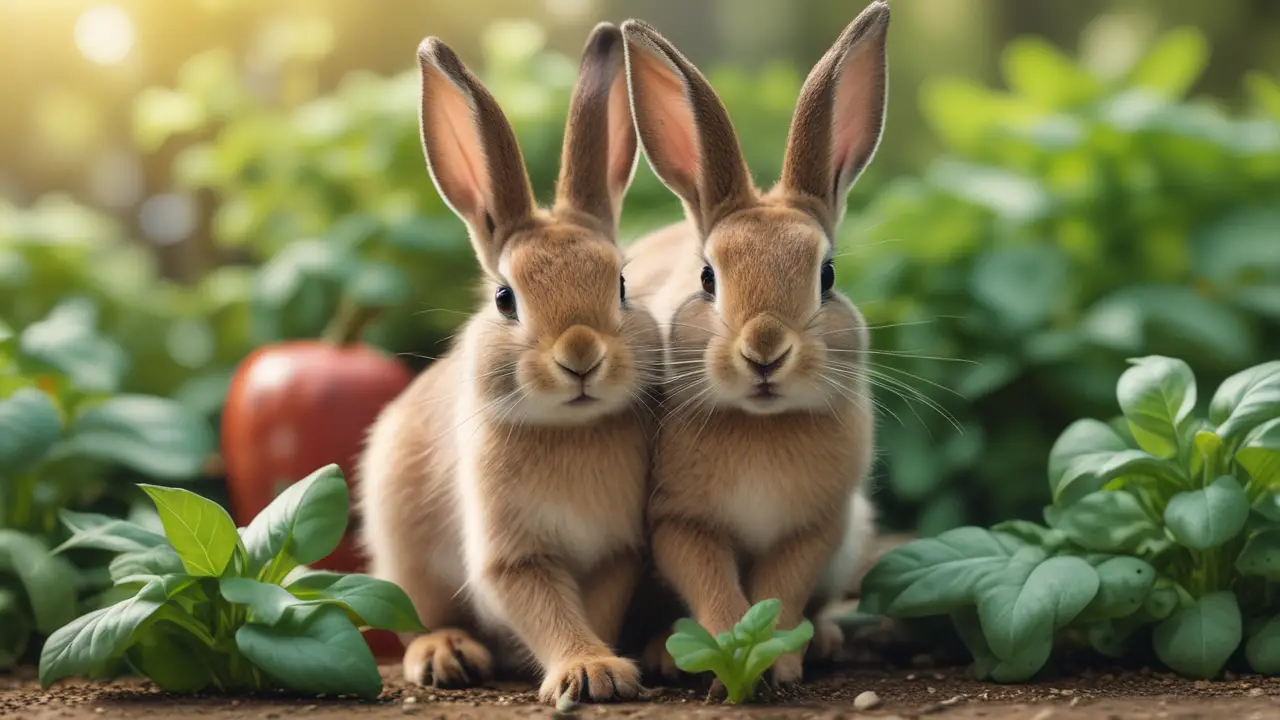Key Highlights
- Yes! Rabbits can eat basil, and it is a wonderful treat.
- This tasty herb has vitamins, minerals, and antioxidants that can help your bunny.
- Moderation is key! If they eat too much basil, it might upset their stomach.
- Always pick fresh, organic basil. Slowly add it to your rabbit’s diet.
- Mix basil with a balanced diet of hay, fresh veggies, and other herbs for a happy and healthy bunny.
Curious about changing your rabbit’s diet? If you are wondering, “Can rabbits eat basil leaves?” the answer is yes. There are a few important things to keep in mind. Fresh basil can be a tasty treat for your bunny. It is also a nutritious addition that gives good flavor and important nutrients. However, it is best to introduce new food like basil slowly and in moderation. This can help avoid any digestive upset.
The Surprising Health Benefits of Basil for Rabbits
Basil is rich in important vitamins and minerals. This makes it a good food choice for your bunny. It has vitamin K, which helps the blood clot healthily. Basil also has vitamin A, which is good for the immune system. These nutrients help support your rabbit’s overall health.
Basil, like other herbs such as oregano and rosemary, has antioxidants. These strong compounds help protect your rabbit’s cells from damage. This promotes good health and well-being.
Essential Vitamins and How They Support Rabbit Health
One important nutrient in basil is vitamin K. This vitamin helps with healthy blood clotting. It is very important for rabbits. It helps stop too much bleeding when they get hurt.
Basil is a significant source of vitamin A. This vitamin helps keep the immune system strong. A strong immune system is very important for rabbits. It helps them fight infections and stay healthy.
Adding basil to your rabbit’s food can improve their nutrition. Since rabbits are herbivores, basil can help with their body functions. Always check with your veterinarian about the right amount of basil for your rabbit before you change their diet.
The Role of Antioxidants in Rabbit Wellness
Basil, along with many other veggies and herbs, is rich in antioxidants and potassium. Antioxidants play a key role in protecting the body’s cells from harm caused by free radicals. Free radicals are unstable molecules that can lead to inflammation and may weaken the immune system.
Adding foods that are high in antioxidants, like basil and blueberries, to your rabbit’s diet can help boost their natural defenses. A strong immune system is important for their overall health. It also lowers the risk of certain diseases.
Antioxidants are good for you. They work best when you include them in a balanced diet. This diet should provide your rabbit with all the nutrients needed to be healthy and grow well.
Understanding the Risks: Is Basil Always Safe for Rabbits?

Basil is often safe and can be good for rabbits. Still, you need to be careful when you add it to their diet. Rabbits have sensitive stomachs. Eating too much basil can lead to digestive issues, such as gas, bloating, or diarrhea. You should also stay away from herbs like chives, which can be harmful.
Basil contains calcium, similar to other herbs like parsley and cilantro. Calcium is a vital mineral for rabbits. It comes from many food sources. However, too much calcium can cause urinary issues like bladder stones. To prevent these problems, ensure your rabbit has a balanced diet. Use basil as a treat rather than part of their regular food.
Common Digestive Issues and How to Avoid Them
Rabbits’ stomachs are very sensitive. They can feel sick if you give them new food quickly. When you give them basil, start with small amounts. A single leaf is a good place to start.
Monitor your rabbit for any signs of digestive upset. This can show up as diarrhea, soft stools, or a lack of appetite. If you notice any of these signs, stop giving basil immediately and contact your veterinarian. It’s always best to be cautious when introducing new foods to your pet.
Take your time when you introduce new food. If your rabbit does well with a small amount of basil, you can gradually give more.
The Truth About Calcium Content in Basil
Calcium is an important mineral that rabbits need to keep their bones and teeth healthy. However, having too much calcium can lead to issues, such as bladder stones.
Basil contains some calcium. It’s okay to give it to rabbits if it’s part of a balanced diet and given in moderation. Keep in mind that rabbits should mostly get their calcium from leafy green vegetables.
If you give basil to your rabbit as a treat and not their major food, it should not cause too much calcium. If you’re worried, it is best to speak with your veterinarian. They can help you figure out how much basil is good for your rabbit.
Introducing Basil to Your Rabbit’s Diet: A Step-by-Step Guide

When you add basil or any new food to your rabbit’s diet, keep their digestive health in mind. Begin with a small piece of fresh basil leaf or a little bit of coriander. Then, watch how your rabbit reacts. If there are no adverse effects after one day, you can slowly give them more.
Remember that variety is key for a balanced diet for your pet rabbit. Feeding them fresh herbs, like basil, cilantro, and parsley, helps keep their nutrition strong. It also makes mealtime enjoyable for your pet.
How Much Basil is Too Much? Finding the Right Balance.
Basil is good for rabbits, but you should give it to them carefully. Use basil as a treat, not as their main food. A rabbit’s diet should mostly contain:
- Timothy hay: This should be a major part of their diet.
- Fresh vegetables: Offer them a variety of leafy greens and other veggies each day.
You can feed basil to your rabbit several times a week. A good idea is to give a small piece, about the size of your thumb, each time.
Tips for Mixing Basil with Other Rabbit-Friendly Foods
Make mealtime fun for your rabbit by getting creative. Add basil to their diet. A variety of herbs like cilantro, parsley, and dill can also help. Basil adds extra flavor and nutrition to your rabbit’s meals.
Try cutting fresh basil leaves. Mix them with other leafy greens like romaine lettuce or dandelion greens. You can also add small amounts of veggies, such as zucchini. This will give your bunny some variety. It will encourage them to enjoy different greens.
You can give basil by itself as a special treat. Just keep the portions small and do not give too much.
Conclusion
In conclusion, basil can be a tasty and healthy treat for your rabbit. It should be given in moderation and with care. Basil has vitamins and antioxidants that help keep your rabbit healthy. However, you need to be aware of possible gastrointestinal issues and its calcium content. By following a simple guide and combining basil with other rabbit-safe foods, your rabbit can enjoy fun and safe meals. Always put your rabbit’s health first. If you have any concerns, talk to a vet. Your rabbit deserves good care and a balanced diet.
Frequently Asked Questions
Can rabbits eat basil daily?
It’s not a good idea to give rabbits basil every day. Basil is safe for them, but it should only be given in moderation. Giving it to them a few times a week is enough. This way, they can enjoy the benefits while keeping their digestion healthy.
What are the potential health benefits of including basil on a rabbit’s diet?
Adding basil to your rabbit’s diet can be good for their health. It has antioxidants and vitamins. These vitamins support their immune system. Antioxidants help protect their cells from damage.
Are there any risks or concerns associated with feeding basil to rabbits?
Feeding rabbits in different basil is safe. But there are a few minor risks you should know. Too much basil can lead to digestive upset because of the calcium in it. It’s very important to introduce basil slowly. Also, give it to them in moderation.
How should basil be introduced into a rabbit’s diet to ensure their safety and well-being?
When you give basil to your pet for the first time, start with a little bit. Keep an eye out for any bad reactions. If your pet seems okay, you can slowly increase the amount over time. This way, your furry friend can enjoy the new food safely!

Hi, I’m Sondip,
I’m a writer who loves to help people solve their problems. I write about small animals like mice and other small animals and even pests.

